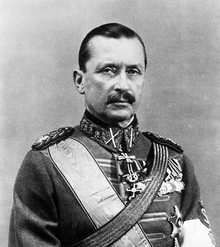C.G.E. Mannerheim
|
Marshal of Finland Baron Carl Gustaf Emil Mannerheim VR SR, SVR SR ketj., SL SR |
|
|---|---|
 |
|
| 6th President of Finland | |
|
In office 4 August 1944 – 11 March 1946 |
|
| Prime Minister |
Antti Hackzell Urho Castrén J. K. Paasikivi |
| Preceded by | Risto Ryti |
| Succeeded by | J. K. Paasikivi |
| Commander-in-Chief of the Finnish Defense Forces | |
|
In office 17 October 1939 – 12 January 1945 |
|
| Preceded by | Hugo Österman (as Commander of the Hosts) |
| Succeeded by | Axel Heinrichs (as Chief of Defence) |
|
In office 25 January 1918 – 30 May 1918 |
|
| Preceded by | post created |
| Succeeded by | Karl Fredrik Wilkama |
| State Regent of Finland | |
|
In office 12 December 1918 – 26 July 1919 |
|
| Preceded by | P. E. Svinhufvud |
| Succeeded by | K. J. Ståhlberg as President of the Republic |
| Personal details | |
| Born |
4 June 1867 Askainen, Grand Duchy of Finland, Russian Empire |
| Died | 27 January 1951 (aged 83) Lausanne, Switzerland |
| Resting place | Hietaniemi cemetery, Helsinki |
| Nationality | Finnish |
| Spouse(s) | Anastasie Mannerheim, born Arapova (divorced 1919) |
| Children | Anastasie (1893–1977) Sophie (1895–1963) |
| Profession | Military officer and |
| Religion | Lutheranism |
| Signature | |
| Military service | |
| Allegiance |
|
| Service/branch |
Imperial Russian Army White Guard Finnish Army |
| Years of service | 1887–1917 (Russia) 1918–1946 (Finland) |
| Rank |
Lieutenant General (Russia) Field Marshal (Finland) |
| Battles/wars |
Russo-Japanese War |
Russo-Japanese War
First World War
Finnish Civil War
Second World War
Baron Carl Gustaf Emil Mannerheim (Swedish pronunciation: [ˈkɑːɭ ˈɡɵˈstav ˈeːmɪl ˈmanːɛrˈheɪm]; 4 June 1867 – 27 January 1951) was a Finnish military leader and statesman. Mannerheim served as the military leader of the Whites in the Finnish Civil War, Regent of Finland (1918–1919), commander-in-chief of Finland's defence forces during World War II, Marshal of Finland, and the sixth president of Finland (1944–1946).
Mannerheim made a career in the Imperial Russian Army, rising to the rank of lieutenant general. He also had a prominent place in the ceremonies for Tsar Nicholas II's coronation and later had several private meetings with the Russian Tsar. After the Bolshevik revolution, Finland declared its independence but was soon embroiled in civil war between the pro-Bolshevik "Reds" and the "Whites", who were the troops of the Senate of Finland. Mannerheim was appointed the military chief of the Whites. Twenty years later, when Finland was twice at war with the Soviet Union from late 1939 until September 1944, Mannerheim successfully led the defence of Finland as commander-in-chief of the country's armed forces. In 1944, when the prospect of Germany's defeat in World War II became clear, Mannerheim was elected President of Finland and oversaw peace negotiations with the Soviet Union and the United Kingdom. (Finland was never at war with the United States.) He resigned the presidency in 1946 and died in 1951.
...
Wikipedia
